The dean of art songs left behind a treasure trove of great melodies.
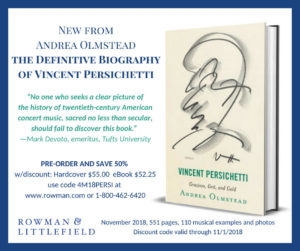 We’re very excited about Andrea Olmstead’s The Definitive Biography of Vincent Persichetti which is about to be published. So excited, in fact, that if you pre-order it before November, you’ll save 50% off. Here’s a factoid for those of you who don’t know much about arguably the most influential music teacher of the 20th century: His 40-year teaching career at Juilliard included students Philip Glass, Steve Reich, Jacob Druckman, Peter Schickele (P. D. Q. Bach), Einojuhani Rautavaara, and many other prominent composers.
We’re very excited about Andrea Olmstead’s The Definitive Biography of Vincent Persichetti which is about to be published. So excited, in fact, that if you pre-order it before November, you’ll save 50% off. Here’s a factoid for those of you who don’t know much about arguably the most influential music teacher of the 20th century: His 40-year teaching career at Juilliard included students Philip Glass, Steve Reich, Jacob Druckman, Peter Schickele (P. D. Q. Bach), Einojuhani Rautavaara, and many other prominent composers.
To pre-order, go to Rowman.com and enter discount code RLFANDF30, or call (800) 462-6420 ext. 3024 and mention the discount code.
Questions or complaints to Larry Bell.
A delightful interview with the about-to-be-nanagenerian composer Thea Musgrave. Don’t miss her 90th birthday concert by the New York Virtuoso Singers, the American Brass Quintet, and various soloists at The Church of St. Mary the Virgin (off Times Square) at 8pm on May 27 in a concert of choral, solo, and operatic works. The concert features the premiere of La Vida es Sueño and the American premieres of The Voices of Our Ancestors and Dawn. Get your tickets here.
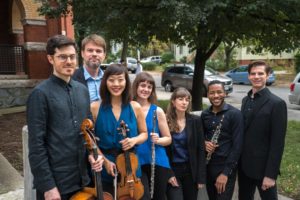 Heads up, New Music fanboys and fangirls. There’s a good looking concert at Roulette on Thursday night called French/American Music in Dialogue that brings together the Boston-based new music ensemble ECCE with its Paris-based counterpart Court Circuit, which is currently on tour with dates in Buffalo, Pittsburgh and Worcester.
Heads up, New Music fanboys and fangirls. There’s a good looking concert at Roulette on Thursday night called French/American Music in Dialogue that brings together the Boston-based new music ensemble ECCE with its Paris-based counterpart Court Circuit, which is currently on tour with dates in Buffalo, Pittsburgh and Worcester.
Founded by composer John Aylward, Clark University Professor, 2017-18 Guggenheim Foundation Fellow and winner of the 2018 Walter Hindrichsen Award from the American Academy of Arts and Letters, ECCE’s mission is to deliver its energetic performances of new music in multiple forms and collaborations with creative artists and thinkers across disciplines. Activities encompass an annual concert season culminating in the international Etchings summer music festival.
Philippe Hurel and conductor Pierre-André Valade created the ensemble Court-Circuit in 1991. “Created by a composer for composers”, Court-circuit from the outset was a place of experimentation, an art project promoting intense risk-taking in a spirit of total freedom. A strong commitment to contemporary music is the real cement of the ensemble. Court-circuit is led by Jean Deroyer.
Featured works include the world premiere of Aylward’s Narcissus, the final work in a series of ensembles pieces that culminates Aylward’s years-long exploration of Ovid’s Metamorphoses, Christophe Bertrand’s
Sanh, Philippe Leroux’s Continuo(ns) and the U.S. premiere of his Prélude & Postlude à l’épais, David Felder’s Partial [dis]res[s]toration, and Philippe Hurel’s Figures libres. Tickets and more information here.
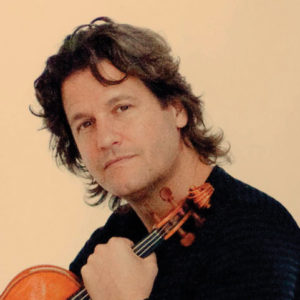
There aren’t many cities in the American south where it can be fairly said that chamber music is more popular than shrimp and grits and Charleston is one of them. Each year, beginning in late May (May 25, this year), the historic Dock Street Theatre becomes home to the Bank of America Chamber Music series—11 unique programs, 33 total concerts—performed over a two-week period during Spoleto Festival USA.
“The Dock Theater seats about 450 people. We perform to 33 different audiences during the Festival and there is rarely an empty seat during any of the concerts. I don’t know any other city in the world—big cities included—where that would happen,” says Geoff Nuttall, whose official title is The Charles E. and Andrea L. Volpe Director for Chamber Music.
Nuttall’s day job is co-founder and first violinist of the sensational St. Lawrence Quartet. Since he took over the Spoleto chamber programming from the venerable Charles Wadsworth in 2009, he has become much beloved by locals for his adventuresome programs, keen wit, musical knowledge, and radical hairstyle changes. The varied programs reflect Nuttall’s eclectic tastes and passion for music within and beyond the traditional canon–as well as new music and young performers.
New to the Festival this year will be the JACK Quartet, one of the world’s most in-demand string ensembles, known for their dedication to new American compositions. JACK will perform during Programs I – V, in works by such composers as Pauline Oliveros, Joshua Roman, and Philip Glass—including Glass’s new String Quartet no. 8, which the JACK Quartet premiered in February 2018.
On Programs II and X respectively, JACK Quartet and English trombonist Peter Moore, who, in 2014 at just 18 years old, became the youngest musician ever appointed to the London Symphony Orchestra as co-principal trombonist, will play in world premieres by this year’s Chamber Music series composer-in-residence Doug Balliett.
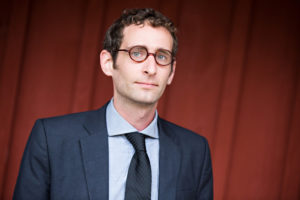
Balliett, whose music has been described by our friends at I Care If You Listen as “weird in the best possible way,” is also an accomplished and active double bassist, radio personality, and Juilliard School professor. Four of his works will be presented during the Festival, including two world premieres: Gawain’s Journey, an octet for St. Lawrence String Quartet and JACK Quartet, and Fanfare for Trombone, Double, Bass, and Bass Clarinet. Balliett will also play double bass on eight of the 11 programs.
And, if that’s not enough, he has arranged the 1986 Queen song, “Who Wants to Live Forever” for 12 musicians. Appearing on Program XI, the arrangement will feature vocalist Paul Groves, a decorated tenor who has performed with the Metropolitan Opera for 25 seasons.
Each of the Bank of America Chamber Music series’ 11 programs are performed three times with two performances daily at 11:00am and 1:00pm in the 463-seat Dock Street Theatre, located at 135 Church Street. The series is also recorded and broadcast by South Carolina Public Radio and syndicated nationally and internationally by the WFMT Radio Network.
Tickets to the 2018 Bank of America Chamber Music series can be purchased anytime at spoletousa.org or by calling the Festival box office at 843.579.3100 from 10:00am to 6:00pm Monday through Friday and from 10:00am to 2:00pm on Saturdays. Beginning May 1, tickets will be available at the box office as the Charleston Gaillard Center.
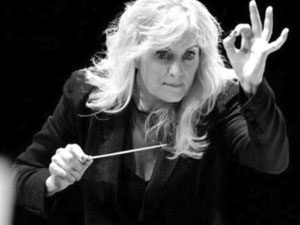 Orchestra Moderne, a new ensemble founded by conductor Amy Andersson in March, will debut at Carnegie Hall on Saturday, October 7, 2017 at 8pm with a program celebrating the legacy of immigration to America titled The Journey to America: From Repression to Freedom (Part 1).
Orchestra Moderne, a new ensemble founded by conductor Amy Andersson in March, will debut at Carnegie Hall on Saturday, October 7, 2017 at 8pm with a program celebrating the legacy of immigration to America titled The Journey to America: From Repression to Freedom (Part 1).
The inaugural program features Peter Boyer’s Grammy-nominated work Ellis Island: The Dream of America, a haunting tribute to historic American immigration features seven actors reading stories chosen from the Ellis Island Oral History Project, accompanied by an emotional orchestral score and projected photos from the Ellis Island Immigration Museum. Also on the program is Overture to Light by Emmy-winning composer Lolita Ritmanis, the world premiere of Steven Lebetkin’s compelling Violin Concerto with soloist Momo Wong, and the beloved Fanfare for the Common Man by Aaron Copland.
Andersson is perhaps best known for bringing video game music and film scores to the classical concert hall through the music of Konji Kondo, the Japanese music composer, pianist, and sound director who works for Nintendo. She has led performances of Kondo’s The Legend of Zelda: Symphony of the Goddesses around the world. She is also a professor at the Berlin University of Arts, the music director at the CPE Bach Gymnaisum orchestra, and has led numerous opera productions in Germany.
Orchestra Moderne NYC aims to will engage audiences by performing music from film scores, video games such as 먹튀사이트, and concert music that is relevant and connected to the important cultural issues in our society. Its stated mission is “to create musical experiences that celebrate humanity and are connected to key social issues, resonating with diverse audiences of music lovers, and providing inclusive opportunities for all composers and performers including women and minorities.”
Tickets are available for purchase here and range from $17.50 to $50.
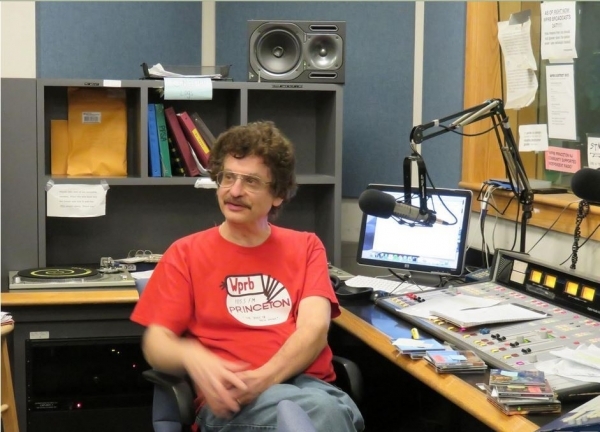
The indefatigable Marvin Rosen is marking 20 years of broadcasting his indispensable radio program “Classical Discoveries” on WPRP in Princeton, New Jersey (and on the web) and to celebrate the occasion he is doing two special programs this week; one, tomorrow, May 29 from 5:00 till 11:00am and another broadcast on Wednesday, May 31, from 5:00 till 11:00am. Marvin’s two main interests in music are old music–Baroque and before–and new music–composers who are still breathing or still modestly still warm in their graves. He was probably the first person with a radio show to begin championing the music of living composers and certainly the only one to have survived for two decades. He even beat us (Sequenza21) by a couple of years.
Marvin became seriously interested in classical music in 1966. There was always great music playing in his home, he says, and after relatives took him to Leonard Bernstein’s “Young People’s Concerts” in New York City, he was hooked.
“That was probably the greatest inspiration for me and my love of serious music. There has ever been a better or more inspirational classical music teacher. I don’t think we’ll ever see anyone quite like him I again. I feel very blessed to have grown during that time.” (Ed: I must confess I trace my love of classical music to the same source although my exposure to those concerts was entirely through television.)
Marvin went on to acquire a doctorate in music education from Columbia University and become a full-time music educator with the Westminster Conservatory in Princeton. He was managing the record department at Princeton University’s store in 1997 when he got a chance to fulfill his childhood dream of being a disk jockey after a volunteer position opened up at WPRB.
“I still have my first playlist,” Marvin says. “It is handwritten, since we didn’t go online until 2001. There were works by Bach, Mozart, and Scarlatti on that program, there were also works by Philip Glass, Richard Yardumian, and even Lennon-McCartney’s “Eleanor Rigby.”
Hundreds of playlists later, Marvin is still as enthusiastic as he was on day one. Even the prospect of getting out of bed at 3am on a snowy day in Princeton cannot discourage him from making his appointed rounds. He is ably abetted in this passion by his wife Beata Rzeszodko-Rosen who acts as kind of volunteer co-producer, archivist, webmaster, marketing consultant and cheerleader. (She gets up, too.)
Among the folks whose music you’ll hear this week are Antonio Caldara, George Crumb, Daniel Dorff, Ross Edwards, Eriks Esenvalds, Joep Franssens, Vladimir Godar, Galina Grigorjeva, Amanda Harberg, Jennifer Higdon, Gao Hong, Alan Hovhaness, Haji Khanmammadov, Wojciech Kilar, Vladimir Martynov, Claudio Monteverdi, Robert Moran, Victoria Poleva, Jaan Raats, Arnold Rosner, Andrew Rudin, Terje Rypdal, Gaetano Maria Schiassi, Alex Shapiro, and others.
On behalf of the Sequenza21 gang, past and present, we send many congratulations and much love. Thank you for being such an important part of the now thriving new music community and for showcasing the work of so many talented people. On a personal note, thank you for turning me on to the music of Alan Hovhaness. The world needs more people who do what they love and love what they do. You’re a mensch.
If you miss the show, a Playlist and MP3 File *(available after the broadcast till June 15, 2017).
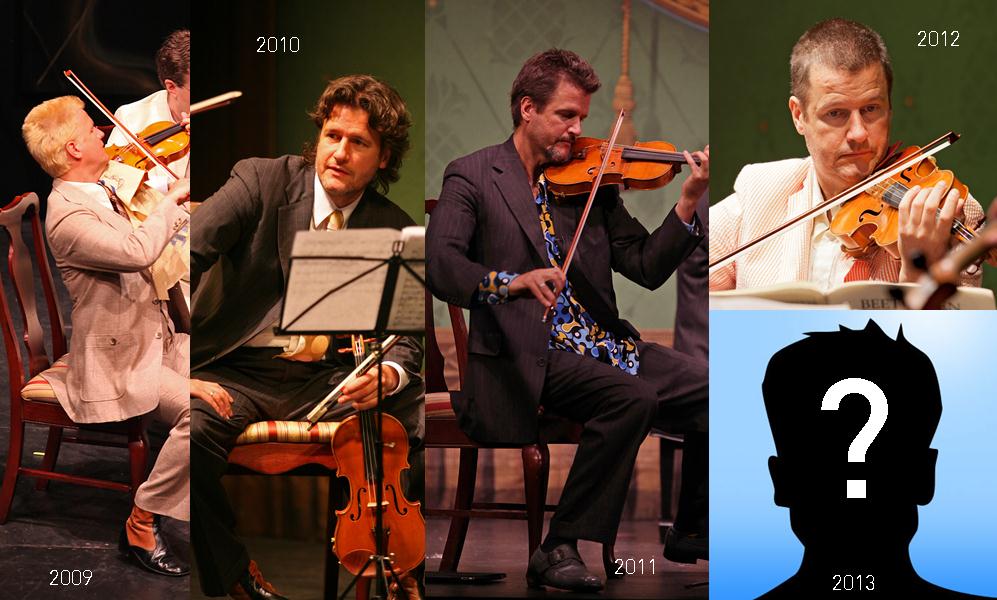 Geoff Nuttall is looking for a few good rocks. One for each hand of 60 random patrons who show up at Charleston’s Dock Street Theater this Friday at 11 am or 1 pm for the first 2017 concert of Spoleto Festival USA’s immensely popular Bank of America Chamber Music Series. The rocks will be there for a piece called Trans for Percussion Solo and Audience, written by composer Lei Liang. The percussion solo will be performed by the legendary percussionist Steven Schick; the audience part will be performed by the 60 patrons who have been armed with rocks. The same program opens with Vivaldi’s Oboe Concerto in D Minor and closes with Glinka’s Divertimento Brilliante from themes from Bellini’s La sonnambula, with another modern piece by this year’s composer-in-residence Jaroslaw Kapuscinski, sandwiched in between.
Geoff Nuttall is looking for a few good rocks. One for each hand of 60 random patrons who show up at Charleston’s Dock Street Theater this Friday at 11 am or 1 pm for the first 2017 concert of Spoleto Festival USA’s immensely popular Bank of America Chamber Music Series. The rocks will be there for a piece called Trans for Percussion Solo and Audience, written by composer Lei Liang. The percussion solo will be performed by the legendary percussionist Steven Schick; the audience part will be performed by the 60 patrons who have been armed with rocks. The same program opens with Vivaldi’s Oboe Concerto in D Minor and closes with Glinka’s Divertimento Brilliante from themes from Bellini’s La sonnambula, with another modern piece by this year’s composer-in-residence Jaroslaw Kapuscinski, sandwiched in between.
“I am not really that thematic in approach to programming,” Nuttall says. “You want the individual pieces to work together but you also want each of them to be distinctive and stand out on their own.” He favors, what the architect Robert Venturi, once described as “a messy vitality over obvious unity.”
Nuttall is a consummate showman who has shown up just about every year with a different hair style—ranging from wavy to spiky to blond, Marcello Mastroionni to Gomer Pyle in length. Audiences love it.
But, don’t be fooled, the Spoleto chamber music schedule is a demanding one. Eleven programs, each played three times, over a 16-day period. “Not for the faint of heart,” Nuttall says.
The opening program is a typical day at the office for the always surprising Nuttall, first violinist and co-founder of the improbably still-cool-after-28-years St. Lawrence String Quartet, lecturer and Artist-in-Residence at Stanford University, and Artistic Director of the Spoleto Festival USA Chamber Music Series, a post he inherited in 2009 from–and with the blessing of–the venerable pianist Charles Wadsworth, who guided the program for three decades (not to mention his leadership of the Chamber Music Society of Lincoln Center for many years.)
It was an inspired choice. Nuttall is one of those rare people who can explain complex music in a way that is engaging, entertaining and often downright funny. The New York Times labeled him the “John Stewart of classical music”, in fact, his comedic style is closer to that of Charleston native Stephen Colbert.
Born in College Park, Texas, Nuttall’s family soon moved to London, Ontario, Canada where he spent a few happy years skating on ponds and playing hockey until someone discovered he had violin talent and packed him off–at the age eight, while he still had his fingers and teeth–to Lorand Fenyves at The Banff Centre. He went on to the University of Western Ontario, and the University of Toronto, where he received his bachelor of arts.
Among the guest artists, Nuttall has scheduled this year are percussionist Steven Schick, countertenor Anthony Roth Costanzo, oboist James Austin Smith, violinist Livia Sohn, pianists Pedja Muzijevic and Stephen Prutsman composer/cellist Joshua Roman, Swiss-born pianist Gilles Vonsattel, and the Rolston String Quartet, a young Canadian ensemble that won the 2016 Banff International String Quartet Competition—an award won by the St. Lawrence many years ago.
Nuttall admits his programming choices are often influenced by the guest musicians who he chooses to perform.
“I’ve wanted to feature a percussionist for awhile now and when Steve Schick, who is one of my favorite musicians, agreed to do it, I started looking for pieces that would work. But the repertory for percussion is so specific, there’s only so much to pick from. And because it is so specific there has to be a certain balance in the rest of the concert. That’s why I chose the Iannis Xenakis contemporary solo percussion piece “Rebonds” for the first concert—to really showcase Steve’s outstanding musicianship. But then it’s balanced out with Vivaldi.”
Another modern piece on the program this year was written specifically for Schick by composer Gustavo Aguilar and is called Wendell’s History for Steve: Part I. It’s a solo work in which Schick improvises on various percussion instruments while reciting poems by the cow patty poet Wendell Berry.
There’s lots of Vivaldi on the program this year which require the talents of counter tenor Anthony Roth Costanzo but also provides an occasion for what looks to be an entertaining bit of fun. On June 10 and 11, Costanzo will sing “Crying,” a song written and famously performed the counter tenor Roy Orbison.
“I learned that Roy’s widow had once asked Anthony to perform it at a benefit and I said ‘We’ve got to do that.” Steve Prutzman put together a dynamite arrangement and it’s going to be great.”
That’s the kind of surprising programming that has made the Chamber Music Series the most consistently popular and enduring element of Spoleto Festival USA.
“I am amazed at the dedication of Charleston chamber music fans,” Nuttall says. “The Dock Theater seats about 450 people. We perform to 33 different audiences during the Festival and there is rarely an empty seat during any of the concerts. I don’t know any other city in the world—big cities included—where that would happen.”
In the spirit of, ummm, hope and change, my composer friend Rodney Lister has written a wonderful new song.
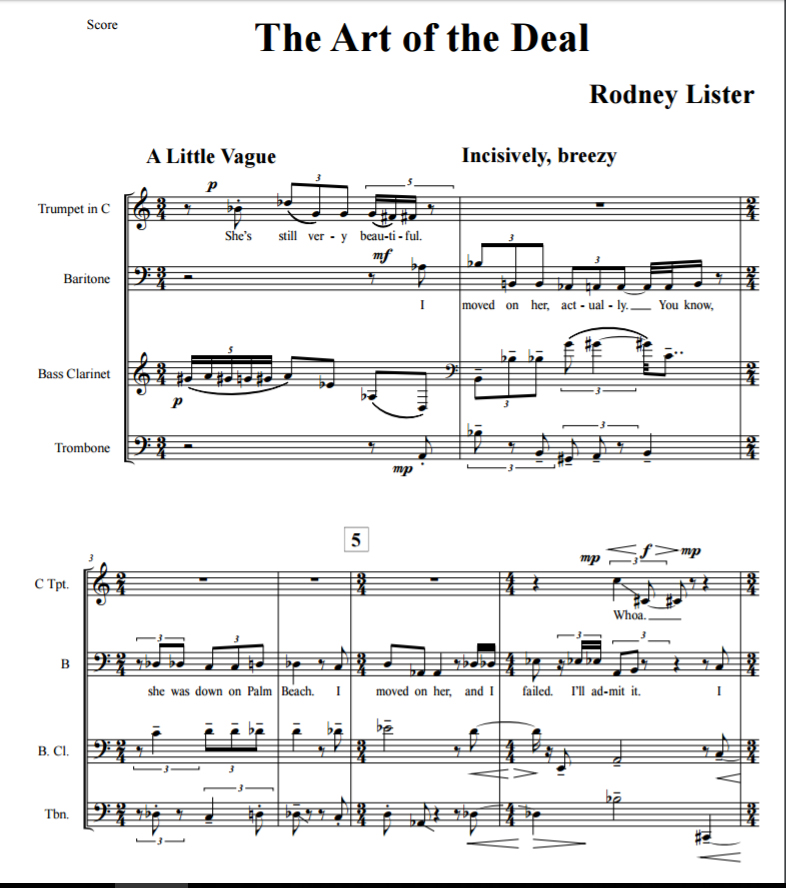
Hard to believe that the venerable Bang on a Can Marathon began as a one day concert on Mother’s Day 1987 in a SoHo art gallery. That’s 30 years ago for those of you keeping score at home. Since then it has grown into a multi-faceted performing arts organization with a broad range of year-round international activities that have had a profound influence on New Music around the world. As the NYTimes puts it: “The current universe of do-it-yourself concert series, genre-flouting festivals, composer-owned record labels and amplified, electric-guitar-driven compositional idioms would probably not exist without their pioneering example. The Bang on a Can Marathon, the organization’s sprawling, exuberant annual mixtape love letter to its many admirers, has been widely emulated…”
The 30th Anniversary Bang on a Can Marathon will be presented for the first time at Brooklyn Museum on Saturday, May 6, 2017 from 2-10pm in the Museum’s Beaux-Arts Court. As always, the event will be a mix of boundary-busting music from around the corner and around the world featuring eight hours of rare performances by some of the most innovative pioneering composers and musicians on the planet.
his year the Marathon includes music from such diverse places as Iraq (Amir ElSaffar and his Two Rivers Ensemble), India (Brooklyn Raga Massive), Morocco (Innov Gnawa), and the Caribbean (Pan in Motion and Kendall Williams), plus Bang on a Can co-founder and Pulitzer Prize-winning composer Julia Wolfe’s folk ballad Steel Hammer, based on over 200 versions of the John Henry ballad, a quintessential American legend of the laborers that worked the railroad.
In a statement, co-founders Michael Gordon, David Lang, and Julia Wolfe say, “Thirty years ago we started dreaming of the world we wanted to live in. It would be a kind of utopia for music: all the boundaries between composers would come down, all the boundaries between genres would come down, all the boundaries between musicians and audience would come down. Then we started trying to build it. Building a utopia is a political act – it pushes people to change. It is also an act of resistance to the things that keep us apart.”
The Marathon is also part of A Year of Yes: Reimagining Feminism at the Brooklyn Museum, a yearlong project that celebrates the 10th anniversary of the Elizabeth A. Sackler Center for Feminist Art through ten diverse exhibitions and an extensive calendar of related public programs. Women artists on this year’s marathon include music and/or performances by Meredith Monk, Julia Wolfe, Joan La Barbara, Carla Kihlstedt, Caroline Shaw, Kaki King, Kim Deal, Merrill Garbus (tUnE-yArDs), Women’s Raga Massive, and many more.
Highlights of the 2017 30th Anniversary Bang on a Can Marathon include:
- Oberlin Contemporary Music Ensemble directed by Timothy Weiss, playing Dutch composer Louis Andriessen’s hard-driving Platonic masterpiece De Staat (“The Republic”), written as a commentary on the debate about the relation of music to politics
- Brooklyn’s mesmerizing steel pan band Pan in Motion playing music by composer Kendall Williams
- Hindustani all-stars Brooklyn Raga Massive paying special tribute to the Brooklyn’s Museum’s A Year of Yes with an all-female ensemble Women’s Raga Massive
- Bang on a Can co-founder and Pulitzer Prize-winning composer Julia Wolfe’s folk ballad Steel Hammer, based on over 200 versions of the John Henry ballad, a quintessential American legend of the laborers that worked the railroad
- Renowned saxophonist, composer, painter, and poet Oliver Lake, co-founder of the internationally acclaimed World Saxophone Quartet
- Joan La Barbara’s A Murmuration for Chibok, which honors and keeps in the present over 250 school girls abducted in Chibok, Nigeria by Boko Haram in 2014, performed by the award-winning Young People’s Chorus of NYC, led by Francisco Nuñez
- New York’s legendary and inspirational composer-singer Meredith Monk leading the women of her acclaimed vocal ensemble in a set of shimmering a cappella pieces from her work-in-progress, Cellular Songs
- Bang on a Can’s extreme mobile ensemble Asphalt Orchestra performing music by Merrill Garbus/ tUnE-yArDs, Kim Deal/Pixies, and more
- The song-spinning duo Rabbit Rabbit, Carla Kihlstedt and Matthias Bossi
- A rare solo set by Pulitzer-prize winning composer-singer-violinist Caroline Shaw
- The distinctive and exceptional indie-guitarist Kaki King
- The ambient music world of Laraaji
- The Moroccan grooves of Brooklyn’s Innov Gnawa, exploring Mococco’s venerable gnawa music tradition
- Amir ElSaffar’s Two Rivers Ensemble, an all-star sextet of jazz and Middle Eastern musicians that blends maqam music of Iraq and contemporary jazz
- The New York premiere of Bang on a Can co-founder Michael Gordon’s No Anthem, premiered by Ensemble Modern in 2015
- The Brooklyn premiere of David Lang’s Just, featured in last year’s Oscar nominated film Youth by Paolo Sorrentino
- And Bang on a Can’s social engagement wing Found Sound Nation’s Street Studio, a mobile recording studio equipped for passersby and Marathon musicians alike to spontaneously create and record original music
2017 BANG ON A CAN MARATHON SCHEDULE (subject to change):